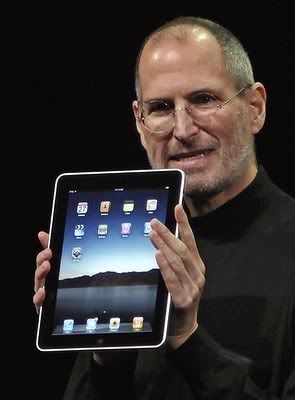So all this jumble of talk on Apple’s latest gadget-child has been buzzing around the fringes of my consciousness for a good while now without me stopping to pay attention and actually seeing what all the hype is about. After all, I was (and still am) pretty convinced that I am simply not going to get an iPad. And then today, feeling somewhat unable to work, I decided out of curiosity to finally bring up Mr Job’s little keynote in which he introduced the iPad, and gave it a watch-over.

And damn, I gotta say. Apple really has this one nailed.
It sounds ridiculous at first, at least to me it did. Why in blazes would I want to lug around something so awkwardly and awfully huge (compared to a regular mobile device) that doesn’t pack half the power I get with a regular laptop? However, watching that video, I realized for the first time how much I had overestimated the girth of the thing from all the front-view photos I’ve seen. The iPad is really thin. And you know what’s more? It’s sized and shaped like a book. Or a photo-album, or a magazine, or a picture frame. Looking at Jobs fiddle with the device as he sat on the couch, I realized that the iPad is not something you bring with you on your work day that keeps you in touch – it is not a ‘phone’ or an ‘organizer’, nor is it something you put on a table to furiously get documents written, software developed, or work done – it is not a ‘desk’. The darn thing is a book. Something you sit down with at the end of the day to read, or to pass around a table of friends and family. A book whose content easily and naturally spans gigabytes of stored pictures as well as the entirety of the wide Internet, that nonetheless sits demurely on your lap as a light and smooth, hand-friendly, wireless little board.

Jobs is right, you can’t do that with a laptop nor a mobile device. Not quite like you could with an iPad.
And this is when the ingenuity of the whole thing struck me. Not only has Apple managed to pry it’s feelers deep into the awkward space between the laptop and the mobile and actually drag out a relevant problem. They have cast the problem and solved it in a way that maximizes their strongest competencies. The iPad looks and feels the way it does because Apple has a developed reputation as a hardware-design perfectionist. You know what else it has a strong reputation for? User interfaces and software that are – yes, prescribed and yes, dictated – but sexy and fool-proof.
The diabolical beauty of it is that nobody in their right mind will get an iPad if they needed more advanced functionality – iPad is something you only acquire expressly for simple computing/surfing/entertainment needs. So you can’t even blame Apple for putting you in a pretty little walled garden.
Put in another way, the use-cases the iPad is designed for is so Apple-centric that no one else is probably gonna be able to quite build ‘another iPad’ for awhile.
And where does all this leave us? Apple has taken an uncannily powerful lead, in mindshare if not in sales, as we begin striding our way into the age of smartphones / smart-small-devices. I won’t deny that this unsettles me greatly. As a fervent user of a “non-standard” and “arcane” desktop platform (yes, that’s what Linux is where I live), I have suffered heartily under Microsoft’s long reign, and given the recent events I have a feeling that things won’t be any better (it may even be worse) under an Apple rule.
I guess the simple conclusion is that we (free software) gotta buck up. Hope still remains, of course, for the landscapes of the budding mobile age to be defined by freedom, choice and interoperability. But we’re gonna have to build some pretty amazing devices and software/interfaces to get there. Frankly, things look a little sticky and grim at the moment with all the ridiculous patenting and lawsuiting going around in the smartphone space. But I do hope. And it is because I believe KDE will eventually find itself somewhere along the front-lines of that hope, that contributing to KDE, however minute and hit-and-miss my efforts be, remains one of the few things I do that I can truly ascribe meaning and purpose to.
If only said meaning and purpose translated to more spare time and hence actual useful work :(

Andreas
I don’t quite understand why Jobs’s keynotes are widely considered to be impressive. Hyperbole and cheap tricks…
“A magical and revolutionary device at an unbelievable price” – what a load of crap.
Also, stupid idea to make an “e-book” without an e-ink screen. It hurts your eyes after a few hours. And if it’s not a good e-book reader, what the hell is it?
It’s a very big iWhatever.
Lucas
Everything you say is correct. My problem is why didn’t they combine it with the MacBook air? A tablet version of the macbook air would serve everything this thing does and still be a laptop as well. I have no use for a iPad but a tablet version of the air I could use and would probably buy.
Morty
I think Apple got the form factor or tablet device right and will do well, but they will not own the market segment because of their lock-in policy and frankly rather crippled and overpriced hardware.
As opposed to many, you got it when you realized it’s use case. The people behind an early contender for this device space the CrunchPad, coined a very apt term for the use of such devices: couch computing.
In any case there will emerge lots of such devices(cheaper), innovating ones and outright iPad clones, from China. Most will initially run some version of Android on Cortex-A8(like the iPad) or Cortex-A9 based ARM devices. And as we have seen from several blogs the last year, there has already been some success running KDE on the Nokia N900(Also a Cortex-A8, but slower). So there will be no surprises when we start seeing the rise of the KDE PlasmaPads.
Name
??? ipad is bull-crap, all right? period.
Jason
I won’t buy one until I can do video skype.
Frank
The idea of the iPad is ok. Its Apple, so it ought to be revolutionary ;)
But what they really did absolutely right is the screen resolution and format. No crappy 16:10 or 16:9 (when will there be 21:3?). I really miss the days of 4:3, because most time you won’t watch a movie on your display, but do real work with real documents and none of them are wide scape…
anonymous
It seems it’s an only thing they did right, but it probably sucks compared to other tablets.
trevorl
I agree with you that Apple have understood the use cases for this device and delivered an elegant implementation (though with plenty of room for enhancements in the next version). However, the device itself should be relatively easy to emulate using ARM processors and a Linux-based OS.
What is much harder to compete with is the highly integrated content delivery and monetisation platform Apple has put together. I think that’s Steve Jobs real strength; he can envisage this combination and has the determination and clout to get the big content players onboard on his terms.
No doubt Google will extend Android to tablets and provide a reasonable content delivery service. But Android is a rather limited form of open-ource.
I think it is Amazon that will suffer as I just don’t see Kindle being as compelling (whether because of or despite it having e-ink). They have really missed an opportunity to actively involve themselves with open-source projects by providing an equivalent content delivery platform with open APIs. That would allow companies to build tablets using the likes of Meego or KDE that could compete with Apple and Android.
WindPower
I hate to admit it, but you know what? You’re right. I don’t hate to admit that you’re right, but I hate to admit that the situation is dire for open-source. They are barely catching up with modern desktops, and now the desktop dies and technology goes mobile, where things are more locked-down and you can’t do whatever you want or install the OS you want (even if that device is often running Linux). What’s going to happen? As much as I like KDE, I don’t think it is the answer. It is still severely tied to the desktop paradigm, with windows and toolbars and all. These things simply don’t work on mobile devices.
Jason "moofang"
@ Andreas: Personally I felt the single most brilliant thing Jobs did this keynote is to sit on a couch while demo-ing the thing :) None of that hyperbolic language quite compared to seeing him use the device as it is intended. Also, clearly it is meant to be more than an ebook, but oh well.
@ Morty: I know! I’m personally really excited about Plasma Mobile, but exciting as the technology is and as fast as we are progressing on it, Apple is already steadily gathering repute in the end-userbase that we won’t be able to even reach in awhile…
@ Anon, trevorl : My personal view, though I hope I’m wrong, is that it’s not that simple. Linux is damn solid technology and you are right that it’ll be trivial to replicate *features*, but for years on the desktop we have not quite been able to produce the kind of user-experience package that is Apple’s primary selling point. Not even Google, imo, will be able to compete directly with Apple in this particular area in the near future. Which is why the name Android today doesn’t quite carry the punch (to a regular joe) that iPhone does.
@ WindPower : We can hope to change the platform locked-down-ness in the mobile space I think – technically it wasn’t feasible in the past but we’re getting there I think. Which is why I think the birth and development of open platforms like MeeGo that really lets you mess around with it are critical. And about KDE, it’s not obvious from the Plasma Desktop we are used to using everyday, but we have already jumped on the boat so to speak – development and experimentation is actively underway even today on creating a Plasma interface complete with phone and keyboard plasmoids as well as full-screen “app-like” plasmoids that work sensibly on mobile devices. We can expect a tech preview of that with 4.5, so I’ll personally be keeping my fingers crossed :)
trevorl
aJason : I understand your point about Apple’s uniquely strong user-experience and have pondered about that myself. I would go so far as to describe Apple as a user-experience company. Every point of contact with their customer e.g. product, web site, retail stores is imbued with a similar ‘feel’ and aesthetic which is carefully designed and ruthlessly controlled from Cupertino.
Another way to look at this is that Apple is a design house, where the aesthetic vision of the founder pervades everything. In this sense Apple is more like a French or Italian fashion company than another technology company. In essence it is a company based on emotion and intuition – and diametrically opposite to Google that is ruled by the rationalisty of algorithms and data. Hence iPhone versus Android.
This argues for increased participation of designers working with coders in open source. It is happening but perhaps the aim should be more direct involvement early in the development cycle when key interface decisions are being made that are fundamental to the user-experience.
Another factor is that Apple has a longer and closed development cycle and only releases features that are polished – otherwise it’s happy to leave them to the next release. This is in total contrast to open source which releases early and often, with features being refined in public, maybe over several releases. This certainly allows open source to compete on features (perhaps out compete) but the result is a user-experience that never seems ‘finished’.
Open source cannot switch to the Apple model, but it needs to look for more ways to turn the open model to its advantage. For example, more proactive and objective methods of gaining feedback from users, acknowledging areas that are deficient, and communicating that action is being tasken to address them.